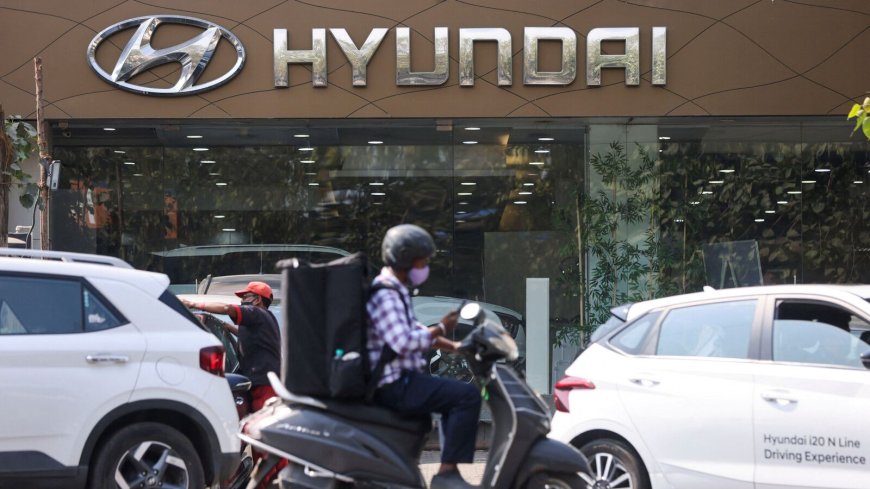Hyundai Motor India Q4 Results: Net Profit Falls 3.7% to ₹1,614.3 Crore, Revenue Rises Slightly; Dividend Announced
Hyundai Motor India Q4 FY24 results show a 3.7% YoY decline in net profit to ₹1,614.3 crore despite a 1.5% rise in revenue. The company declared a dividend amid volume moderation.

Hyundai Motor India Q4 Results: Net Profit Falls 3.7% to ₹1,614.3 Crore Despite Revenue Growth; Declares Dividend
Introduction: A Mixed Bag for Hyundai Motor India in Q4 FY24
Hyundai Motor India Ltd. (HMIL), the country’s second-largest passenger car maker, released its financial results for the fourth quarter of FY24, showcasing a nuanced picture of modest revenue growth countered by a decline in net profit. The company's net profit slipped 3.7% year-on-year to ₹1,614.3 crore, while total revenue from operations rose 1.5% YoY to ₹20,555.2 crore for the March quarter.
While the topline marginally improved, the bottom line was impacted by rising input costs, a slower-than-expected volume ramp-up, and pressure on margins due to elevated promotional spending. Despite the squeeze, the company has announced a dividend, reaffirming its commitment to shareholder returns.
Key Financial Highlights (Q4 FY24):
| Metric | Q4 FY24 | Q4 FY23 | YoY Change |
|---|---|---|---|
| Net Profit | ₹1,614.3 crore | ₹1,676.5 crore | -3.7% |
| Revenue from Operations | ₹20,555.2 crore | ₹20,247.8 crore | +1.5% |
| EBITDA | ₹2,434 crore | ₹2,610 crore | -6.7% |
| EBITDA Margin | 11.8% | 12.9% | -110 bps |
| Dividend Announced | ₹12 per share | ₹10 per share | +20% |
What Caused the Profit Decline?
While Hyundai has maintained its market position, several factors weighed on its bottom line:
-
Higher input costs: Steel, aluminum, and semiconductor-related costs remained elevated, hurting margins.
-
Competitive pricing pressures: With rivals offering aggressive price cuts and bundled features, Hyundai increased its promotional outlays.
-
Product mix shift: More sales in lower-margin models like the Grand i10 Nios and Exter diluted blended profitability.
-
Export slowdown: Weak demand from Africa and Latin America affected high-margin export contributions.
Revenue Growth Driven by New Launches and Mid-Size SUVs
The 1.5% increase in revenue may seem tepid at first glance, but it was driven by strong demand for new launches like the Exter micro SUV and the updated Verna sedan, as well as continued enthusiasm around the Creta facelift, which remains one of the top-selling SUVs in the segment.
Rural demand improved sequentially, and Hyundai’s dealer network expansion in Tier-II and Tier-III cities aided volumes. However, the volume-led growth was partly offset by discounts and low realization from entry-level models.
Dividend Declared: Rewarding Shareholders Amid Margin Pressures
Despite softer earnings, Hyundai Motor India has declared a dividend of ₹12 per equity share, up from ₹10 in the same quarter last year. This reflects the company’s strong cash position and its confidence in future performance.
This move is seen as a signal of stability to investors, especially at a time when many auto companies are adopting a cautious approach due to global macroeconomic uncertainty and regulatory challenges.
Segment-Wise Performance
Passenger Vehicles (PV):
-
Hyundai sold 1,74,200 units domestically in Q4 FY24, flat YoY.
-
The SUV segment accounted for over 60% of sales, led by Creta and Venue.
Exports:
-
Exports fell 9.2% YoY to 40,000 units, due to geopolitical disruptions and softer demand in emerging markets.
EV Strategy:
-
Hyundai’s electric vehicle volumes remain modest, but the company announced plans to locally assemble the IONIQ 5 and launch new EV models by 2026 to strengthen its green footprint.
Management Commentary
Mr. Unsoo Kim, MD & CEO, Hyundai Motor India:
“We continue to grow despite short-term pressures. Our strategic focus on SUVs, new technology integration, and deeper rural penetration is bearing fruit. The upcoming EV portfolio will further cement Hyundai’s leadership in future mobility.”
Mr. Tarun Garg, COO, Hyundai Motor India:
“Margins were impacted due to a combination of factors, but the fundamentals remain strong. We are prioritizing long-term value creation over quarterly volatility. The dividend announcement underscores our commitment to stakeholders.”
Industry Context: How Hyundai Stacks Up
The Indian auto industry saw moderate growth in Q4 FY24, with two-wheelers leading the charge while passenger vehicles posted flat-to-modest growth due to high base effect, delayed deliveries, and tighter financing norms. Hyundai’s performance was largely in line with the industry average, though rivals like Tata Motors and Mahindra & Mahindra posted stronger SUV growth.
Hyundai’s challenges also highlight the intensifying competition in the mid-size SUV segment, where multiple brands are pushing aggressively with features, pricing, and financing schemes.
Outlook: Navigating Challenges with a Balanced Strategy
Going forward, Hyundai has outlined several key initiatives:
-
EV Expansion: Targeting 6 EV launches by 2030, with the IONIQ 5 and IONIQ 6 to be locally assembled starting 2025.
-
Capex Push: ₹4,000 crore earmarked for plant modernization, R&D, and EV infrastructure in Tamil Nadu and Maharashtra.
-
Product Pipeline: A new micro SUV, hybrid Verna, and connected vehicle features to be introduced in FY25.
While headwinds like high raw material costs, regulatory hurdles, and a crowded EV market loom large, Hyundai is betting on a diversified portfolio and tech innovation to maintain its market share.
Stock Market Reaction
Though Hyundai Motor India is unlisted, its parent company—Hyundai Motor Company (HMC)—traded 1.2% lower on the Korean exchange (KRX) following the results. Analysts believe the dip reflects margin pressure in Indian operations, which contribute significantly to global profitability.
Brokerage houses such as Nomura and CLSA have maintained their “Hold” ratings on HMC, citing volume stability but tempered margin outlooks in emerging markets like India and Brazil.
Investor Takeaway
For investors and industry observers, Hyundai’s Q4 FY24 results are a mixed read. While the topline remains strong and dividend declaration is a positive, the erosion in margins points to near-term challenges in maintaining profitability.
However, Hyundai’s disciplined capital allocation, focus on electrification, and expansion in Tier-II and Tier-III markets present a resilient long-term story in India’s rapidly evolving auto landscape.
Investors should monitor:
-
Raw material cost trends
-
Success of new launches like the Exter and upcoming EVs
-
Export recovery and macro headwinds
-
EV penetration and regulatory frameworks
A Quarter of Realignment, Not Retreat
Hyundai Motor India’s Q4 FY24 numbers, while not blockbuster, reflect a resilient core operation navigating short-term turbulence. With strategic investments in electrification, innovation, and customer experience, the company is well-placed for long-term value creation—even as it deals with cyclical headwinds.
The message is clear: Hyundai is not slowing down—it’s recalibrating for the next wave of growth.
What's Your Reaction?
 Like
0
Like
0
 Dislike
0
Dislike
0
 Love
0
Love
0
 Funny
0
Funny
0
 Angry
0
Angry
0
 Sad
0
Sad
0
 Wow
0
Wow
0












































































